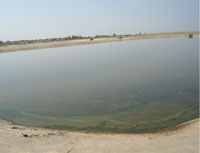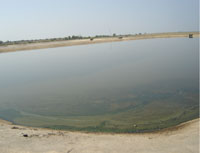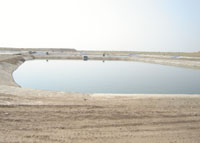
Yemeni-German cooperation runs deep [Archives:2007/1107/Last Page]
November 29 2007
 |
 |
The German Financial Cooperation, or KFW, began operating in Yemen in 1969 with infrastructure projects such as constructing Sana'a International Airport and the road linking Sana'a and Taiz, followed by training in health, urban water supply and sanitation linking the appropriate development services to key ministries, explains Irene Fellmann, development cooperation counselor at the German Embassy.
She adds that KFW now has a comprehensive program encompassing education, vocational training, reproductive health, water supply and sanitation, urban development, preserving cultural heritage, promoting small enterprises, promoting rural self-help, computerized information management systems and energy sources.
Moreover, Fellmann notes, “Sector-wise, four priority areas have been defined for our bilateral governments: urban water supply and sanitation; integrated water resources management and solid waste management; basic education and healthy family planning and, finally, economic reform and economic development emphasizing generating jobs.”
However, she says there are two crucial preconditions to such development cooperation. First, the partner country's government should define a clear policy framework in which countries like Germany and the donor community as a whole can integrate their contributions.
For example, the Basic Education Development Strategy shows to what extent a clear and convincing sector policy definition can mobilize additional international assistance, being formulated in all major fields.
Secondly, there can be no sustainable development without favorable conditions for active participation by all segments of the population – men, women, civil society and the private sector, as well as a properly functioning public administration.
Fellmann notes, “For the sake of sustainability, we'd very much welcome it if the Yemeni government would vigorously pursue its efforts in administrative reform, civil service reform and good governance.”
Zaid Abutalib, projects director at the Ministry of Water and Environment's Hodeidah Water supply and sanitation local corporation, explains that KFW is financing 60 percent of the $9.2 million sanitation project in Zabid, while the Yemeni government is financing 40 percent.
He notes that the project's main components are a sewer network of approximately 43 kilometers of pipeline and a wastewater treatment plant and pumping station, adding that the Ministry of Water and Environment also is the participating agency consultant.
So far, 3,980 pipes have been connected, with an additional 150 pipes being connected very soon. Residents will pay only YR 4,000 to obtain this new service, for which they also may pay in installments. “The charge is cheap due to German support of the project with the necessary materials, drilling and setup,” Abutalib explains.
Abdulraqeeb Al-Hamadi, technical manager of water supply and sanitation in Zabid, explains, “Water supply and sanitation uses pumps in order to move the water easily between Zabid and the project location, which is about six kilometers. Additionally, we close one of Zabid's pools or basins for cleaning every six months.”
He adds, “The German Technical Cooperation, known as GTZ, has a major role in this project, which includes training locals to be knowledgeable in this field because they will manage it.”
KFW's senior program officer in Sana'a, Ali Manshalin, further notes that his firm also is financing 85 percent of the Beit Al-Faqih and Bajil sanitation projects, with the Yemeni government financing the other 15 percent, at a cost of $20.76 million. The supposed timeline for those projects is 40 to 50 years.
Fadthel Amin, health director of the Beit Al-Faqih water supply and sanitation project, notes that his project's main components are a wastewater treatment plant employing the pond system and a network of 74-kilometers of uPCV pipes.
Mohammed Al-Faqih, financial director for the same project, reports that 2,000 pipes have been connected this month. “Moreover, we will have connected 6,610 pipes by the end of 2008. This water project will benefit 50,000 residents.”
The main components of the Bajil project are a wastewater treatment plant using the pond system and a sewer network of approximately 99 kilometers of uPCV pipes. Manshalin notes that approximately 3,249 of Bajil's 70,000 residents so far are benefiting from the sanitation project.
Um Hani, a member of and public relations officer for the Bajil Water Supply and Sanitation local cooperation, who also was trained by GTZ, points out, “Most locals still use the old water system, but we've talked to them and explained the advantages for them, using television videos and photographs. The most important thing is that we receive religious individuals' help by allowing them to talk about the project in mosques. Surely, residents are becoming convinced day after day.”
Saleh Al-Hakami, senior advisor of stakeholders dialogue and public awareness at GTZ, says, “The Bajil sanitation project, which began in March 1988, includes purifying drinking water. KFW and GTZ also are financing that particular project at a cost of YR 65.46 million.”
He adds, “There are five wells in Bajil's sanitation project. Three are being used and the other two will be operating soon.”
Fellmann notes, “Yemeni-German cooperation was $73 million in 2007-2008, compared with $22 million for education, health, sanitation projects, water and fighting corruption in general. Germany's contributions to Yemen were the highest of all donor countries in 2004.”
She adds, “Yemen is considered a pivotal country for German support. Germany never ever will halt or rescind its support for Yemen.” Numerous development, finance and technical organizations are operating in Yemen, including GTZ, KFW, the German Development Service or DED, Senior Experten Service, the Friedrich Ebert Foundation, the Federal Institute for Geosciences and Natural Resources (BGR) in Yemen and the Center for International Migration and Development or CIM.
Al-Hakami explains, “GTZ's overriding goal in Yemen is poverty reduction, based on the government's Poverty Reduction Strategy. GTZ began its activities in Yemen in 1969. Since then, more than 60 projects have been implemented at a total cost of $283 million provided by grants from the German government.”
KFW has 35 years of fruitful cooperation with Yemen, having committed and disbursed funds in excess of $440 million. All projects are implemented by Yemeni partner institutions, most with dedicated KFW teams in Germany who frequently visit Yemen.
The focal points of KFW are urban water supply and sanitation, basic education, economics, development and health. KFW also deals with challenging issues, such as conflict management and Yemen's Poverty Reduction Strategy.
DED conducts many activities in Yemen, such as developing new training courses and fostering cooperation between vocational training institutes and companies in order to incorporate their needs into the curriculum and expose students to the real working environment. It also focuses on developing the capacity of professional associations to organize and represent their numbers and defend their interests, in addition to providing them training and other services.
——
[archive-e:1107-v:15-y:2007-d:2007-11-29-p:lastpage]


